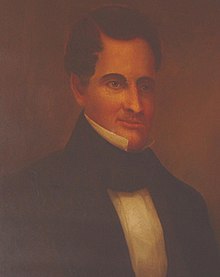Thomas Kirker
| Thomas Kirker | |
|---|---|
 |
|
| 2nd Governor of Ohio | |
|
In office March 4, 1807 – December 12, 1808 |
|
| Preceded by | Edward Tiffin |
| Succeeded by | Samuel H. Huntington |
| 4th Speaker of the Senate of Ohio | |
|
In office December 1, 1806 – December 3, 1809 |
|
| Preceded by | James Pritchard |
| Succeeded by | Duncan McArthur |
|
In office December 3, 1810 – December 5, 1813 |
|
| Preceded by | Duncan McArthur |
| Succeeded by | Othniel Looker |
|
In office December 5, 1814 – December 3, 1815 |
|
| Preceded by | Othniel Looker |
| Succeeded by | Peter Hitchcock |
| 10th Speaker of the Ohio House of Representatives | |
|
In office December 2, 1816 – November 30, 1817 |
|
| Preceded by | Matthias Corwin |
| Succeeded by | Duncan McArthur |
| Member of the Ohio Senate | |
|
In office 1803-1815 1821-1825 |
|
| Member of the Ohio House of Representatives | |
|
In office 1803 1816-1817 |
|
| Personal details | |
| Born | 1760 County Tyrone, Ireland |
| Died | February 20, 1837 (aged 76–77) Adams County, Ohio |
| Political party | Democratic-Republican |
| Religion | Presbyterian |
Thomas Kirker (1760 – February 20, 1837) was a Democratic-Republican politician from Ohio. He served as the second Governor of Ohio.
Kirker was born in County Tyrone, Ireland. He moved with his family to Lancaster, Pennsylvania in 1779. Kirker married Sarah Smith in 1790, and moved with his wife to Kentucky. Three years later, they moved to Liberty Township, Adams County, Ohio. Kirker was a consistent Presbyterian, serving as an elder in the West Union congregation from 1808 until his death.
He was a delegate to the Ohio Constitutional Convention in 1802. He served in the first Ohio House of Representatives in 1803 and then in the Ohio State Senate from 1803 to 1815.
While serving as Speaker of the Senate, Kirker became Governor upon the resignation of Edward Tiffin to take a seat in the U.S. Senate. Kirker's term was extended through the 1807–1808 meeting of the Assembly due to the disqualification of Return J. Meigs, Jr. who had won the 1807 election to the governorship but had been disqualified by the Assembly as he had not met the residency requirements.
Kirker ran for re-election in 1808, but lost badly to Samuel H. Huntington. Kirker later returned to the Assembly, serving in the House of Representatives from 1816 to 1817 and in the State Senate from 1821 to 1825.
...
Wikipedia
